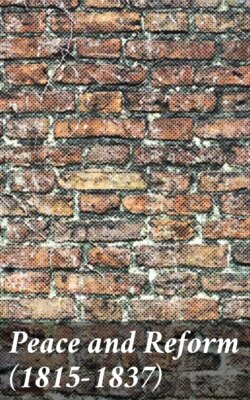Читать книгу Peace and Reform (1815-1837) - Группа авторов - Страница 10
На сайте Литреса книга снята с продажи.
PARISH REGISTERS (1818).
ОглавлениеTable of Contents
Source.—The London Medical Repository, Vol. X. p. 267.
George Man Burrows on Parish Registers.
But I must reiterate, that it will be a work of supererogation to offer either remarks or proposals for establishing improved registers of marriages, births, baptisms, burials, diseases, &c. or for attaining any of the other objects upon which I have dilated, unless all denominations of religion in the whole of the united kingdom be included.
On recapitulation, it appears that the principal defects in the present system are:
1. Registers of marriages, births, baptisms, and burials, or bills of mortality are not kept in every place of religious worship; nor in hospitals and infirmaries having private burying-grounds.
2. Children who die unbaptized are not entered in any register or bill of mortality.
3. Registers of baptism do not set forth the place and date of birth.
4. Registers of burial do not specify where a person died, as well as where he lived, nor his condition, whether single, married, or widowed.
5. There is no certificate provided, showing in what parish a person died, with other necessary particulars, as to age, the disease, &c.
6. A corpse may be removed from a parish within the bills of mortality of London to one without, and the burial be omitted in the returns.
7. There is no medical authority for ascertaining and certifying the nature of the disease of which a person died, &c.
8. The names of diseases in the bills of mortality are either unintelligible, or so arranged as to confound diseases very distinct in their characters.
9. In respect to ages, the periods are injudiciously divided; so that many of the purposes to which the bills are applicable in medical and political science are defeated.
10. The law enforcing the keeping of Registers is defective; and does not adequately regard political, civil, or medical information.
11. All parishes and places of worship within that circle denominated the bills of mortality of London, are not included in the weekly or general annual returns; nor is there any existing authority to enforce their being made, and regularly entered.
Among some of the advantages in medical, political, and moral science, which would result, were proper parochial registers and bills of mortality established and kept throughout the united kingdom, the following present:
I. Medically.—They point out:
1. The causes of many diseases, and their affinity to one another.
2. The rise, situation, increase, decrease, and cessation of epidemic and contagious diseases.
3. The means of guarding against their extension and effects.
4. The comparative healthiness of different countries and places, climates and seasons.
5. The influence of particular trades and manufactures on the human constitution.
6. They elucidate many important and dubious medical points essential to the perfection of the preventive and curative arts.
II. Politically.—They are a means:
1. Of ascertaining the increment or decrement of the population in every place, and at any period.
2. Of accurately ascertaining the population of the country, and at any period.
3. Of diminishing, if not nearly superseding, the immense expense incurred by a census.
4. Of obviating the difficulties, great expense, and frequent disappointment in proving marriages, births, baptisms, and burials, to which persons who are desirous of establishing legal proof of their identity, descent, consanguinity, &c. are still exposed.
5. The present extensive and beneficial system of assurance on lives, reversionary payments, annuities, and legacy duties on the latter species of testamentary property, is founded on calculations deduced from numerous bills of mortality.
6. The prosperity or decay of commerce, manufactures, or trade of any place, is shown by comparing bills of mortality of different dates.
III. Morally.—They mark:
1. The prevalence of moral or licentious habits.
2. The diseases of which the inhabitants of a place die; and, consequently, those arising from luxury or intemperance.
3. The effects of the passions on human actions.
4. By knowing where they are most required, the means of correcting such effects may be the more effectually applied.
